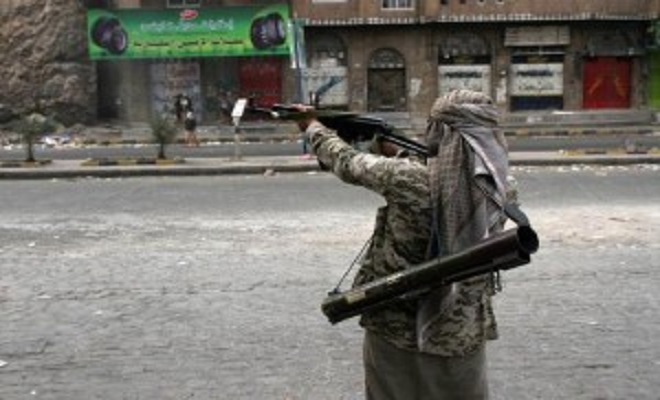 NEO.org
NEO.org
WW3
Forces Align in Yemen After Renewed Saudi Strikes
by , NEO:
The Saudi-led coalition resumed air strikes on Yemeni capital Sana’a after a five-day ceasefire. Dozens of families were forced out of their homes. These are the most large-scale bombings since the five-day ceasefire ended on May 17.
The issue at hand is that the Arabian coalition has so far been unable to combat the Houthis. With the help of former president Ali Abdullah Saleh, their joint forces mounted a quick military offensive to the south of the country and ensured military domination over most of Yemen. Their advantage is indisputable in Aden and in the country’s northern parts. In other provinces (Hadhramaut, Abyan, Taez), the status of local tribal militias is determined by the renewal of massive funding to the local chefs from Saudi Arabia. However, this has so far been limited to several localities. The attempt to incite a mass revolt in Aden in late April-early May with the help of former Prime Minister of the People’s Democratic Republic of Yemen (South Yemen) Haidar Abu Bakr al-Attas has also failed.
Presently, “the president-in-exi
It is clear that Ali Abdullah Saleh will continue to hold onto his former stance: he has nowhere to run and the ultimate goal of his one-and-only strategy is guaranteeing that his tribe remains in the highest echelons of executive and military power. Riyadh does not intend to hand over these guarantees. However, the Houthis currently hold the military upper hand. Moreover, their leadership is currently ripe with stout supporters of “a war to the bitter end”, that is, the recreation of a Zaidi Muslim State. Most of the moderate Houthis leaders were lost during the suicide bombing of a Zaidi mosque in Sana’a in March. The other Houthis who are willing to find a compromise have been excluded from key decisions. Thus, it is still clearly premature to talk about the beginning of any real and effective peace talks. Neither the Houthis, nor Abdullah Saleh nor the members of the Arabian coalition, Saudi Arabia in particular, have any desire to hold such peace talks.
Another very important factor is Iran’s influence on the situation in Yemen. Naturally, this influence is not as far-reaching as the Arabian monarchies would have us believe. There are presently no more than 20 instructors from the Lebanese “Hezbollah” among the Houthis who were sent there in mid-April at the request of the commander of the Al-Quds Iranian special forces brigade Gen. Qasem Soleimani to provide operational guidance on matters of security. As for Iran’s arms shipments, this is highly doubtful given that the domestic Yemeni market is saturated with weapons. There is, of course, financial help coming from Tehran, but it is veiled behind the Houthis’ branch office in Frankfurt am Main. Amidst all this, Tehran will, naturally, continue to play the “Yemeni card” in various political and diplomatic ways in order to create a permanent source of tension on the southern border of its main regional rival – Riyadh – and to divert Saudi forces away from the Iraqi-Syrian direction. Presently, the so-called “humanitarian aspect” of the Yemeni conflict will continue to remain at the forefront of discussions.
Iran’s actions are focused primarily on creating a political climate that will freeze the current situation in place and sow the necessary seeds to preserve the Houthis as a real political and military force in the country.
Those same humanitarian “losses” caused by the “Arabian coalition” operations are starting to play an increasingly more important role. And these losses are really starting to accumulate. Therefore, a very difficult dilemma has arisen before Riyadh: to sink the Iranian humanitarian convoys or shoot down Iranian transport aircraft, further complicating its relations with the international community, or to let them through, thereby facing the risk of Houthis receiving arms shipments. The United States is also in a tight spot here. On the one hand, they expect the Iranians to help in the fight against ISIS and are negotiating over their nuclear program. On the other hand, however, they are also trying to prove their loyalty to their Arabian allies. It seems that this issue will be included in the discussion the US Secretary of State John Kerry will have during his upcoming visit to Riyadh. In theory, he will put pressure on the Saudi leadership to remove the preliminary and unacceptable conditions set against the Huthis in order for peace talks to resume. However, Riyadh does not wish to see either the Houthis or Ali Abdullah Saleh at the negotiation table. This is where Washington will exert some pressure, as has already been de facto declared through a leak to the media.
Amidst these circumstances, the Security Council supported the initiative of the UN Secretary General to convene an international conference on Yemen in Geneva on May 28. There, Iranian Foreign Ministry spokeswoman Marzieh Afham immediately claimed that the humanitarian situation in Yemen is on the brink of disaster. “The humanitarian situation in Yemen is catastrophic,” she said. “Even during the five-day ceasefire declared by the state, the Saudi-led coalition prevented the delivery of humanitarian aid to Yemen, not to mention the frequent violations of silence as they continued to inflict strikes on innocent defenceless Yemenis. In this regard, Iran has called on the international community to exert pressure on the coalition so that they stop the bombings,” added Afham. “War is not the solution of the Yemeni political crisis. The Islamic Republic of Iran supports continued negotiations in Yemen on a political settlement in the country.” Iranian Deputy Minister of Foreign Affairs Hossein Amir Abdollahian stated that his country will continue to supply humanitarian aid to the Yemeni people affected by the war, stressing that “Tehran supports UN-led internal Yemeni dialogue and believes that without the participation of influential Yemeni parties, the crisis cannot be settled.” Moreover, Iranian television has reported that Yemeni peace talks designed to put an end to the “Saudi Arabian aggression” against the country will be organised by the UN and held in Geneva on May 28.
For today, we can confidently state that the Houthis remain the dominant force in Yemen and without their participation there can be no political process to peacefully resolve the current situation. The “Hadi option” has already been exhausted and his “replacement” is currently being selected. As for Ali Abdullah Saleh, he has put his money on the Houthis. With regard to external factors, we can say that at this stage, Iran’s humanitarian approach is currently winning over Saudi Arabia who placed their bets on war.

















